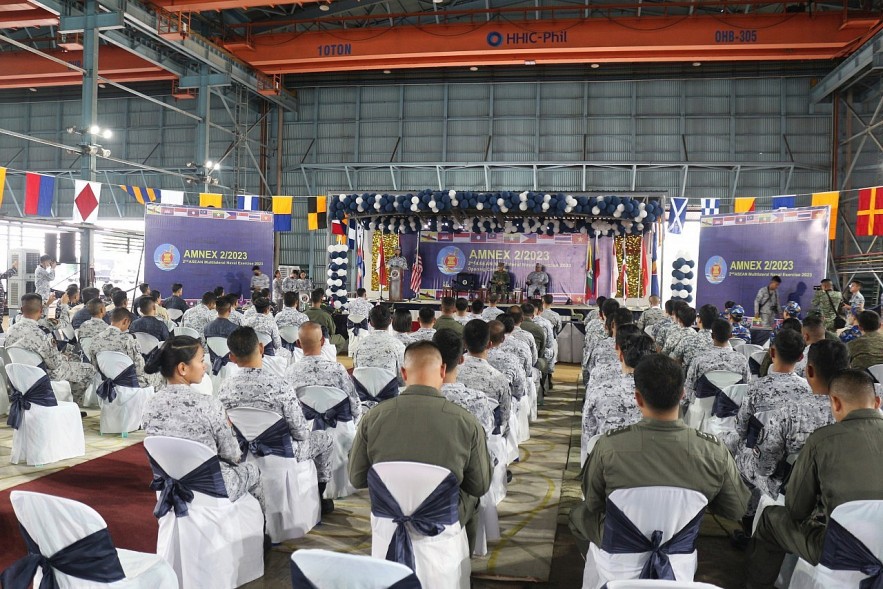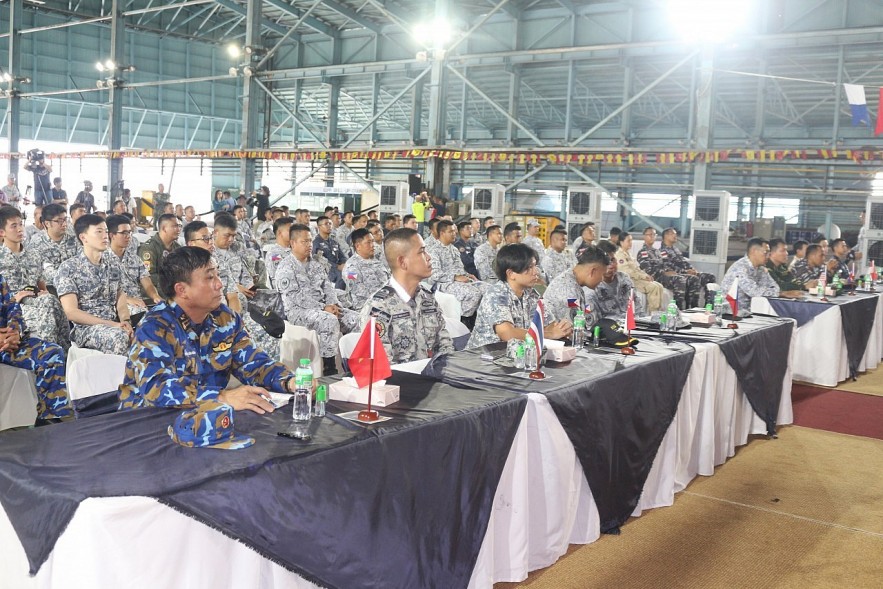 |
| At the opening ceremony of the second ASEAN Multilateral Naval Exercise. |
The second ASEAN Multilateral Naval Exercise (AMNEX 2) opened on May 12th at the Philippines’ Naval Operating Base Subic. This exercise marks the first time all ten members of the Association of Southeast Asian Nations (ASEAN) have come together to train and collaborate on naval and maritime security issues. It also serves as an opportunity for the ASEAN nations to strengthen their maritime capabilities and increase their ability to address regional maritime security challenges. During the exercise, the participating ASEAN navies will conduct a variety of drills and activities, such as maritime security operations, search and rescue exercises, marine pollution response, and counter-piracy operations.
The exercise is a testament to the strong ties between the ASEAN nations and is a reflection of their commitment to regional peace and security. It also highlights the importance of regional cooperation and the need for stronger collaboration on maritime security issues. The exercise is expected to provide valuable insight into how to better address regional security challenges and will help the ASEAN nations to build upon their maritime capabilities.
AMNEX 2 is an important milestone for ASEAN and is an example of the commitment of the ASEAN nations to collaborate and work together to ensure regional stability and security. This exercise is a great opportunity for the ASEAN navies to strengthen their maritime capabilities and increase their ability to tackle regional security challenges.
Naval ships from Vietnam, Singapore, Malaysia, Indonesia, Thailand, Brunei, and the Philippines, the host nation, participated in the exercise.
Vietnam’s Deputy Chief of Staff of Naval Region 4, Colonel Nguyen Van Ngan, and Lieutenant Colonel Ma Nguyen Thanh, Captain of 015-Tran Hung Dao naval ship, attended a special event.
The AMNEX, first held in 2017 in Thailand, is anchored on three core pillars – interoperability, responsiveness, and preparedness – to tackle widespread regional maritime issues. Through this tri-pillar approach, the AMNEX seeks to promote regional collaboration and develop a unified stance on maritime security in the Indo-Pacific region.
Joint exercises planned for May 13 and 14 in waters off Subic Bay, the Philippines, included maritime search and rescue operations, maneuvering, and communication drills.
Amadar highlighted the importance of AMNEX 2 to ASEAN member countries, emphasizing that it is designed to bring forth collective commitments and collaborate to address maritime security issues.
 |
| Vietnam’s Deputy Chief of Staff of Naval Region 4 Colonel Nguyen Van Ngan and Lieutenant Colonel Ma Nguyen Thanh, Captain of 015-Tran Hung Dao naval ship, attends the event. |
The Brigadier General expressed his sincere hope that the participation of ASEAN naval forces would bolster collaboration and ensure the success of the event.
from May 2nd to May 6th.
Earlier, Ship 015-Tran Hung Dao of Brigade 162 participated in activities within the framework of the ASEAN-India Maritime Exercise (AIME), a workshop on humanitarian assistance and disaster reduction (HADR), professional exchange, and the International Maritime and Defence Exhibition (IMDEX) 2023, in Singapore, from May 2nd to May 6th.
AIME allows navies of ASEAN member states and India to strengthen collaboration, enhance understanding, and build confidence in order to address common maritime security challenges at sea.
Meanwhile, as Asia’s leading naval and maritime defence event, IMDEX Asia has mustered the world’s naval elite and the finest fleets of maritime innovations. Since its inaugural event in 1997, the maritime and defence exhibition has steered the industry forward, becoming a platform for businesses of the sea to showcase their latest vessels, systems, and technologies.
Joint patrols help maintain security in East Sea
Many international maritime routes pass through the East Sea, making it the world’s second-busiest shipping lane in terms of commercial activities, after the Mediterranean. The sea, however, has been threatened with potential instability from frequent piracy, while sovereignty disputes over islands are becoming more complex.
Following Rules-based Maritime Borders in Indo-Pacific: India’s Rajnath Singh
India stands for rules-based maritime boundaries in the Indo-Pacific in which no nation, howsoever big, may be allowed to exclude others from its fair use, Defence Minister Rajnath Singh said on Saturday, amid China’s increasing assertiveness in the region. In his address to the heads of Asian Coast Guard agencies, the defence minister also called for effective collaboration among maritime nations to deal with challenges to maritime safety.








